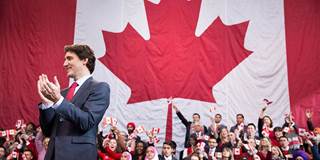This week marks Canada’s first change of government in nearly a decade. To understand what the change will mean for Canada’s relations with the world requires taking stock of the country’s international posture under Prime Minister Justin Trudeau’s predecessor, Stephen Harper.
TORONTO – This week marks Canada’s first change of government in nearly a decade, following the unexpectedly large victory of Prime Minister Justin Trudeau’s Liberal Party in mid-October’s general election. To understand what the change will mean for Canada’s relations with the world requires taking stock of the country’s international posture under Trudeau’s Conservative predecessor, Stephen Harper.
Broadly speaking, the election of Trudeau (whose father, Pierre, was Prime Minister when he was born in 1971 and served from 1968 to 1979, and again from 1980 to 1984) constitutes a rejection of Harper’s polarizing political agenda and antagonistic leadership style. Under Harper, Canada drifted away from multilateral engagement, shirking institutions such as the United Nations in favor of a more aggressive, value-driven foreign and security policy that divided the world into friends and foes.
Harper’s tough talk on Russia’s annexation of Crimea and intervention in eastern Ukraine, and on China’s disturbing human-rights record won him wide public support. But his stance on climate change proved to be more controversial. By withdrawing Canada from the Kyoto Protocol and largely rejecting the issue’s significance (before finally offering limited concessions to reduce the country’s carbon footprint), he diminished Canada’s standing on one of the premier global issues of our time. In the Middle East, Canadian foreign policy was essentially restricted to unflinching support for Israel’s government.

TORONTO – This week marks Canada’s first change of government in nearly a decade, following the unexpectedly large victory of Prime Minister Justin Trudeau’s Liberal Party in mid-October’s general election. To understand what the change will mean for Canada’s relations with the world requires taking stock of the country’s international posture under Trudeau’s Conservative predecessor, Stephen Harper.
Broadly speaking, the election of Trudeau (whose father, Pierre, was Prime Minister when he was born in 1971 and served from 1968 to 1979, and again from 1980 to 1984) constitutes a rejection of Harper’s polarizing political agenda and antagonistic leadership style. Under Harper, Canada drifted away from multilateral engagement, shirking institutions such as the United Nations in favor of a more aggressive, value-driven foreign and security policy that divided the world into friends and foes.
Harper’s tough talk on Russia’s annexation of Crimea and intervention in eastern Ukraine, and on China’s disturbing human-rights record won him wide public support. But his stance on climate change proved to be more controversial. By withdrawing Canada from the Kyoto Protocol and largely rejecting the issue’s significance (before finally offering limited concessions to reduce the country’s carbon footprint), he diminished Canada’s standing on one of the premier global issues of our time. In the Middle East, Canadian foreign policy was essentially restricted to unflinching support for Israel’s government.